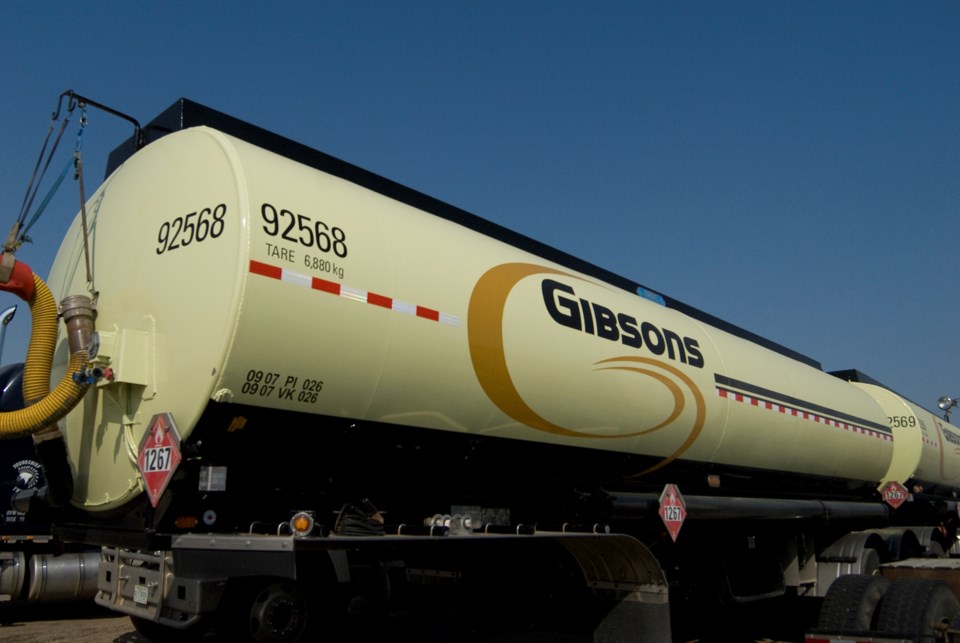Toronto – Saskatchewan’s highways have long seen tanker trucks with the name Gibson emblazoned on them. But that will soon pass. What was once a trucking company, will be one no longer.
Gibson Energy’s 2018 investor dayon Jan. 30 in Toronto, Steve Spaulding, president and chief executive officer, said, “As we take a look a look at Gibson Energy, there’s no doubt our crown jewel is our Hardisty asset, and our Edmonton storage assets. But the question is, how do all the other businesses work together and compliment each other, and how do we grow?”
“What you will see today is a dramatic transformation of the business,” he said. “Gibson Energy will no longer be thought of as a trucking business.”
“We will be a crude oil infrastructure business with high quality cash flow.”
The plan includes continually developing storage assets at Edmonton and Hardisty, and building out additional services in and around those core terminals, and to focus on crude oil basins in Canada and the U.S.
“We want a business that will grow at any crude oil price, so we targeted a strategy that went at a US$45 to US$55 crude oil environment. At that price, both the Canadian oilsands and key oil basins we picked as our focus basins win, and they grow.
They expect another 500,000 to 1 million barrels per day (bpd) growth in Canada over the next ten years. “In the Permian basin, they can grow a million barrels, next year,” Spaulding said.
They’re expecting to grow at least ten per cent per share, with “quality cash flow.”
They’re planning one to two tanks per year at their major terminals. The Canadian oilsands are as strategic asset for Hardisty, and their SCOOP/STACK (Oklahoma) and Permian (west Texas) assets are prospective for gathering system growth. This growth will be financed by asset sales.
“There are assets in our portfolio that just don’t fit. These are good businesses, and really, a lot of great people, that don’t fit our forward strategy,” he said.
Their industrial propane business was sold last year for $412 million. Their U.S. environmental services, including water hauling, is expected to be sold in the first quarter of 2018.
“Gibson Energy has really been known as a trucking company, in the past,” Spaulding said. “Exiting business lines is a tough decision, but we think, the right decision.”
In a schedule laid out in a press release, Gibson laid out target closing dates for four major divestitures. The firs twill be NGL (natural gas liquids) wholesale, in the third quarter of 2018. Non-core U.S. injective stations and truck transport is expected to be gone by the fourth quarter of 2018. Canadian truck transportation is next, in mid-2019. Non-core Canadian environmental services is pegged for mid-2019 as well.
“We get a lot of questions about Moose Jaw,” he said, referring to their asphalt facility there, but he downplayed calling it a refinery, listing at length the key common refinery components not present at Moose Jaw. “It’s literally just two separation towers, two heaters, supply tanks and refined products tanks.”
At its Moose Jaw facility, the company believes there are opportunities to realize further operating and maintenance capital cost efficiencies. The company is also evaluating potential high-return capital projects, including increasing throughput at the facility at an attractive relative cost. Consistent with its infrastructure focus, the company has initiated a process to reduce cash flow variability by securing take-or-pay tolling structures on a portion of output capacity and will re-evaluate the role of the Moose Jaw facility in the future.
Gibson is committed to divesting of its non-core business lines in a timely, structured manner. The Company has continued to advance the sale of its U.S. environmental services business as previously announced, and expects to complete the divestiture by the end of the first half of 2018. As part of the new strategy, the company also intends to divest of several other businesses that have been deemed non-core based on their strategic fit with Gibson’s oil infrastructure focus and target basins.
Gibson has engaged an advisor to support the sale of NGL Wholesale and expects to place all the remaining assets to be disposed into the market by the end of 2018, with a target of concluding the non-core divestiture process by mid-2019. Aggregate proceeds from the sale of non-core businesses are expected to range between $275 million and $375 million, and will be reinvested into the core infrastructure business through funding future growth capital expenditures.
Spaulding said higher oil prices could drive more tank construction, as could pipeline constraints.
“We’re talking about a dramatic change to the business. We will be an oil infrastructure business. We’re going to build in and around our core terminals in Canada, and develop a basin infrastructure strategy. The assets that don’t fit will be sold,” Spaulding said.




